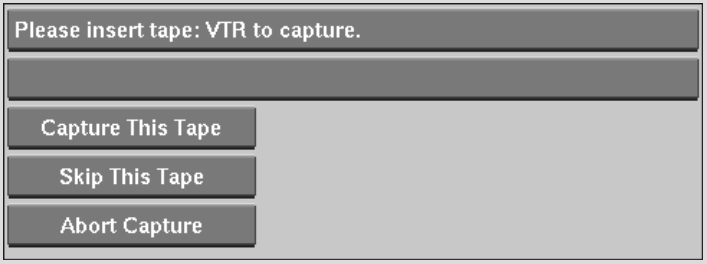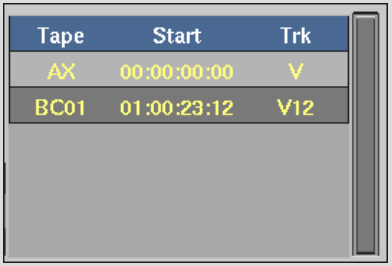- From
the clip library, click Import EDL.
- From
the Import EDL menu, click Load.
The EDL Load menu appears.
- Select
the EDLs that you want to load.
- Optional:
Enable Same Library Reel, if you want to load a series of EDLs and
capture these open EDLs to the same reel in the clip library (using
Multiple EDLs).
- Click
Load.
The selected EDLs are loaded into the Import
EDL module.
- Enter
a name for the clip in the Name field.
- Enter
a library name in the Library Reel field.
- In
the EDL list, select the events that you want to capture. Do any
of the following:
- To
select a single event, click the event number entry. Click the event
number entry of another event to unselect the first entry.
- To
select a range of events, hold Shift,
select an event, and click the last event in the range that you
want to select. You can also click and drag to select a range of
events.
- To
add to a range of events, hold the Ctrl key
or the pen button when you select an event.
- To
select all events, use the Select All or Unselect All buttons.
NoteWhen no event is selected, all events in
the EDL are captured.
- Optional:
Use the Mark and Unmark buttons to keep track of events that you
want to capture. See
Capture Group.
- Click
Capture.
The Auto-Capture menu appears.
- Ensure
that the correct VTR is selected in the Device Name box.
NoteMake sure the VTR is in Remote mode; otherwise,
the clips will not be transferred. You can switch the VTR from Local
to Remote mode only on the VTR panel. If the Local box in the menu
is enabled, the VTR is in Local mode. See
Controlling a VTR.
The frame at the current position of the selected
device is displayed in the image window. You can use the controls
below the image window to play all the clips on the selected device.
See
Viewing Captured and Assembled Material.
- Specify
any VTR options in the Engineering menu. See
Setting Video Input and Output Engineering Menu Controls.
- Optional:
Set the value in the Capture Handles field.
If Force Handles is enabled, clips will be recaptured
if they do not contain at least as many handles as specified in
the Capture Handles field. See
Capture Group.
- To
capture all open EDLs that share the same library reel, enable Multiple
EDLs.
NoteIf you already have one EDL loaded, and
then load another EDL with the Same Library Reel option enabled,
both EDLs will be captured on the same reel in the clip library
as long as Multiple EDLs is enabled in the Capture menu.
- Set
any options for audio sources. See
Defining Audio Tracks to be Captured.
- Click
Auto-Capture.
If a tape is not already loaded, you are prompted
to insert one into the VTR. The options for capture appear.
- Click
Capture This Tape to begin the auto-capture.
To minimize VTR transport, the clips are sorted
according to their positions on the tape. Clips are always captured
in C Mode, regardless of the display sort mode you selected.
- When
required, select a different tape to capture from in the Capture
Order list.
You will need to repeat this for every tape
that you are using during the auto-capture.
- When
the auto-capture is complete, click Exit Auto-Capture.
Each clip is named according to the event number
or clip name comment, and is assigned in and out points set to the
location used by the EDL at the time of capture. Tracks that are
not used by the event are not assigned an output channel (denoted
by “--”).
- Click
Exit Import EDL.
The clips appear in the clip library on a reel
specified in the Library Reel field.





